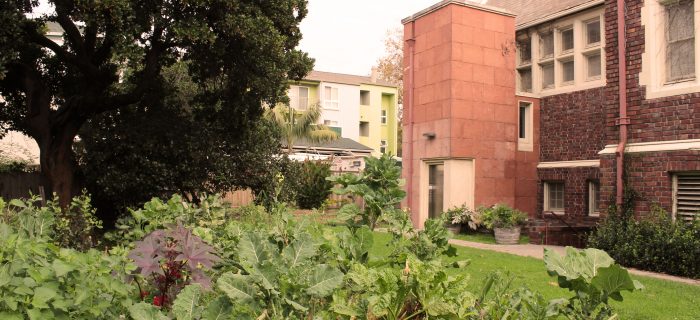Phat Beets, New Gardens: A Community Response to Food Gentrification
Food gentrification is a concern shared by many food justice activists. Fueled by a wave of dietary trends, food justice proponents report food gentrification has driven up the cost of whole and natural foods that have been consumed by many communities for generations.
Many neighborhoods in Oakland, California are rapidly shifting; low-income and people of Color are being pushed out of their homes and communities as a result of increased rent and living costs. A 2015 study by the UC Berkeley Project for Urban Development identified Bay Area locations undergoing rapid gentrification. The study suggests that gentrification is extreme in a number of Oakland neighborhoods; extreme or advanced gentrification is defined as areas that have experienced significant demographic changes and high levels of real estate investment. The researchers also said that the city can expect the displacement of low-income households to increase in coming years.
The costs of such a shift for communities can be high, including increased rent prices, diminished social diversity and inclusion, the displacement of individuals, and an increased cost of overall living – including an increased cost of food. Phat Beets Produce, an Oakland-based nonprofit organization, aims to counter food gentrification by supporting small farmers and farmers of Color in producing food for their communities. Further, Phat Beets works to connect farmers to their urban communities through farmers markets, market gardens, and youth programs.
In an effort to reinforce the relationship between the Oakland community and fresh, accessible food, Phat Beets has launched a new urban garden that is entirely edible and freely available. This project is one of many community-based responses to gentrification in the Oakland area, of which many have become an organizing site for neighborhood, community, and food sovereignty. The garden takes up a small plot of land behind the Oakland Public Library on the corner of Claremont and Telegraph Avenue. Designed and created two years ago as part of Phat Beets’ youth program, the garden was further expanded this fall as more beds were added.
After this initial set-up, however, Phat Beets plans to take a hands-off approach to the garden. Described by a Phat Beets member as a “food forest,” the garden is meant to be completely edible and managed by the surrounding community. Ongoing workshops will be held through the nieghboring Oakland Public Library for garden upkeep, such as tree pruning or building soil, and will be advertised on the Oakland Public Library’s website and message board. Furthermore, the library’s tool library, which contains gardening tools, is available for free to the community to aid in gardening endeavors.
For more information on Phat Beets, visit their website at http://www.phatbeetsproduce.org/about/mission-statement/.
To keep updated on the Oakland Public Library garden and future garden workshops, visit their website at http://www.oaklandlibrary.org.
Stay in the loop with Food First!
Get our independent analysis, research, and other publications you care about to your inbox for free!
Sign up today!Further research and information on the gentrification of Oakland can be found on the UC Berkeley Project for Urban Development website at http://www.urbandisplacement.org/about.


 Help Food First to continue growing an informed, transformative, and flourishing food movement.
Help Food First to continue growing an informed, transformative, and flourishing food movement.




